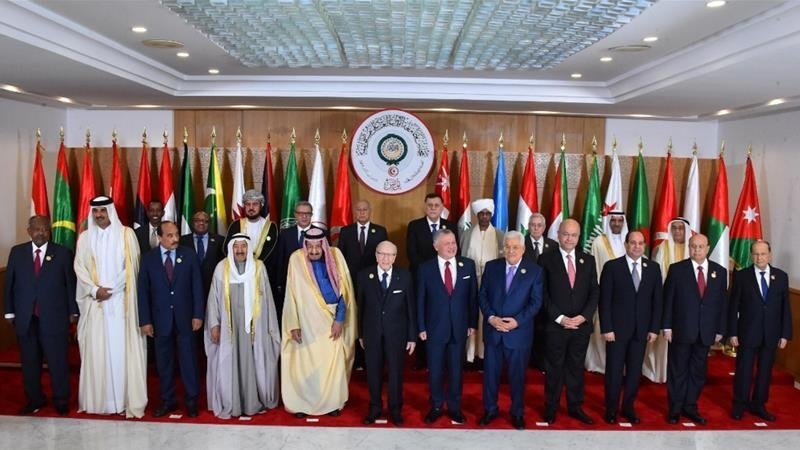


 Arab
leaders pose for the camera ahead of the 30th Arab Summit in Tunis, Tunisia on
March 31, 2019.
Arab
leaders pose for the camera ahead of the 30th Arab Summit in Tunis, Tunisia on
March 31, 2019.
Taking place at a time when the Middle East and North Africa regions have seen many complicated developments, many new "hot spots” have emerged, the AL Summit was expected to create an opportunity for member countries to agree on their stance as well as the way to approach and handle a variety of challenges. One of the issues that took centre stage at the summit was Golan Heights, after the US announced its recognition of Israel’s sovereignty over the Syrian territory. Arab leaders stressed their full support for Syria’s right over the Golan Heights occupied by Israel.
The common stance of Arab countries in this regard has been shown after the US President made a new statement about the Golan Heights. Many US allies in the Gulf have also spoken out against the decision, considering it a serious violation of international resolutions and a threat to the region’s stability. More resolute attitude was expressed when the AL declared it would mobilise the UN Security Council to adopt a resolution drafted by the AL, at the same time consult with legal aspects from the International Court of Justice to oppose the US decision on the Golan Heights.
The Arab states have expressed a consistent support for the righteous struggle of the Palestinians to establish an independent Palestinian State with the capital of East Jerusalem. The summit also reiterated the support for the Arab peace initiative on a just and comprehensive peace in the Middle East and affirmed to pursue restoration of peace talks with Israel. This is also a core issue in the strained relationship between Israel and Arab countries. The Tunis Declaration affirmed that the Palestinian cause will remain a priority for the entire Arab nation. The Arab leaders also reaffirmed the maintenance of all forms of political, spiritual and material support for the Palestinian.
The summit also focused on seeking solutions to conflicts in Syria, Libya and Yemen. The leaders emphasised the need for a political solution to put an end to crises in Syria and Libya based on the negotiation process mediated by the UN as well as other relevant resolutions of the Security Council. They objected to all military options that would exacerbate the situation. The Arab leaders also affirmed their desire to achieve unity and guarantee sovereignty of Syria and Libya. Regarding the relationship with Iran, the AL expressed a softer view, in the spirit of not interfering with each other’s internal affairs, and not using force or intimidating and restraining actions that can be harmful to mutual trust and stability in the region. They also determined to strengthen security cooperation among the member states to promote the fight against extremism and terrorism, thereby activating the Arab Convention for the Suppression of Terrorism.
The two-day summit mentioned a number of important and thorny issues of the region. Although many member countries continue to face domestic difficulties on their own, the Arab countries have shown the spirit of solidarity and cooperation as well as joined hands to address common issues of the region. The tendency towards dialogue is expected to help the Arab states take a more effective approach to dealing with crises and challenges in the region in the time to come.
Source: NDO